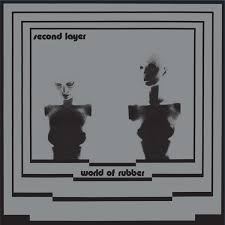As a historical narrative, many of the main players from the post-punk era are today pretty much canonised in hagiographical terms, with people able to recite the cultural shorthand and histories of the likes of Ian Curtis, John Lydon and Genesis P-Orridge. Adrian Borland is someone whom most people won’t know. As the frontman of post-punk band The Sound, he lacked the wan, pretty features of the likes of Curtis, Ian McCulloch or Julian Cope, while also possessing a hair-trigger temper that fed into the band’s aggressive approach with their record company. Despite being praised critically, The Sound’s first three albums, 1979’s Jeopardy, 1981’s From The Lions Mouth and 1982’s All Fall Down failed to translate into commercial sales. While ‘anthemic’ indie contemporaries such as Echo And The Bunnymen (who were signed on the same label), U2, The Cure, and Simple Minds achieved mainstream success, The Sound became one of the ‘lost’ bands in post-punk history, a footnote in the story. After The Sound split up in 1988, Borland would continue making music, but after years of battling both a lack of recognition and severe mental health issues, he committed suicide in 1999.
That should have been the end of the story. But we live in the digital age now and as such no longer abide by a single historical narrative. Thanks to the crate digging blogs of the last several years, Borland’s music, both with The Sound and his side projects have been rediscovered by a new army of online fans. Of particular interest is Second Layer, the duo he formed with The Sound bassist Graham Bailey. Their only album World Of Rubber is now the focus of a reissue by the ever dependable Dark Entries Records, who have collected and remastered Second Layer’s entire discography (their 1981 album World Of Rubber, their two EPs, 1979’s Flesh As Property and 1980’s State Of Emergency, as well as five unreleased demo tracks) into a single collection, in order to create a full statement of reappraisal of Borland and Bailey’s talent.
The first thing that’s noticeable on listening to World Of Rubber is how utterly different the sound and aesthetic of Second Layer is compared to that of The Sound. While The Sound had songs of gloomy introspection and a sweeping romanticism, Second Layer strips all of that away, leaving in its place a monochrome worldview morbidly obsessed with the dehumanising effect of war, nuclear weapon annihilation, and the fracturing and negation of the self within an increasingly distorted and technologically mediated society. Only the track ‘Courts Or Wars’ has a distinct musical affinity to The Sound. The lyrics on World Of Rubber don’t trade in subtlety or ambiguity, instead preferring to overwhelm you with its ugliness. The opening song ‘Definition Of Honour’ has Borland drawling explicit anti-war rhetoric such as "the definition of honour is the hole in the side of your head." ‘Germany’ attempts to articulate the Teutonic man-machine utopia of Kraftwerk gone sour, as the ‘modern vision’ ‘autobahns’, and ‘the steel and iron’ cut Borland down. ‘Underneath The Glass,’ has an almost freakish level of paranoia with Borland neurotically singing about germs, disease, assassination plots, and disturbing things squirming in the brain.
The music, mirroring the blunt lyrics, is as harsh as it is austere, with Bailey’s drum machine rhythms and bass providing the stiff regulatory pulse, and Borland’s abrasive guitar providing the platform onto which faltering synths and industrial metal noises are bolted and welded together. It’s an assemblage of machine parts that seeks to characterise the inhuman worldview shown on the album’s cover, where veins, flesh, skin and emotions are replaced by wires, pistons, plastics and cybernetic feedback circuitry. In some of Second Layer’s earlier tracks such as ‘Metal Sheet’, ‘State Of Emergency’ and ‘The Cutting Room’, there’s a definite electro-rock nod to the likes of Suicide, but by the time they made tracks such as ‘Japanese Headset’, ‘Underneath The Glass’, and ‘Distortion’ they move more into the cyberpunk territory that you hear from Chrome and Cabaret Voltaire. The deep well point in World Of Rubber though has to be ‘Black Flowers,’ an almost apocalyptically grim dirge, with shuffling walls of bass and atonal synth wash, with Borland singing ‘Black Flowers’ like a poisoned nursery rhyme. It’s the sort of song that I’d like to hear at the death of the earth, standing on a beach when the sea turns black and putrid and the grey skies open up and piss blood red acid rain on me.
World Of Rubber, when it was originally released, received only a modicum of attention and was subsequently ignored over the intervening years. On hearing it today, it’s themes of dystopian breakdown and polluted sonics have held up well, in some cases better than much more lauded contemporaries. There’s certainly an eerie parallel with the splintering comedown of society in the late 70s that you hear on World Of Rubber and running-on-fumes precariousness that makes up for our daily lives now. It should be an album that finally gets some deserved attention.
<div class="fb-comments" data-href="http://thequietus.com/articles/18546-second-layer-world-of-rubber-review” data-width="550">


